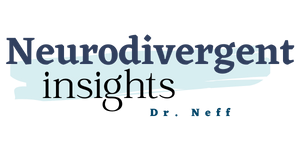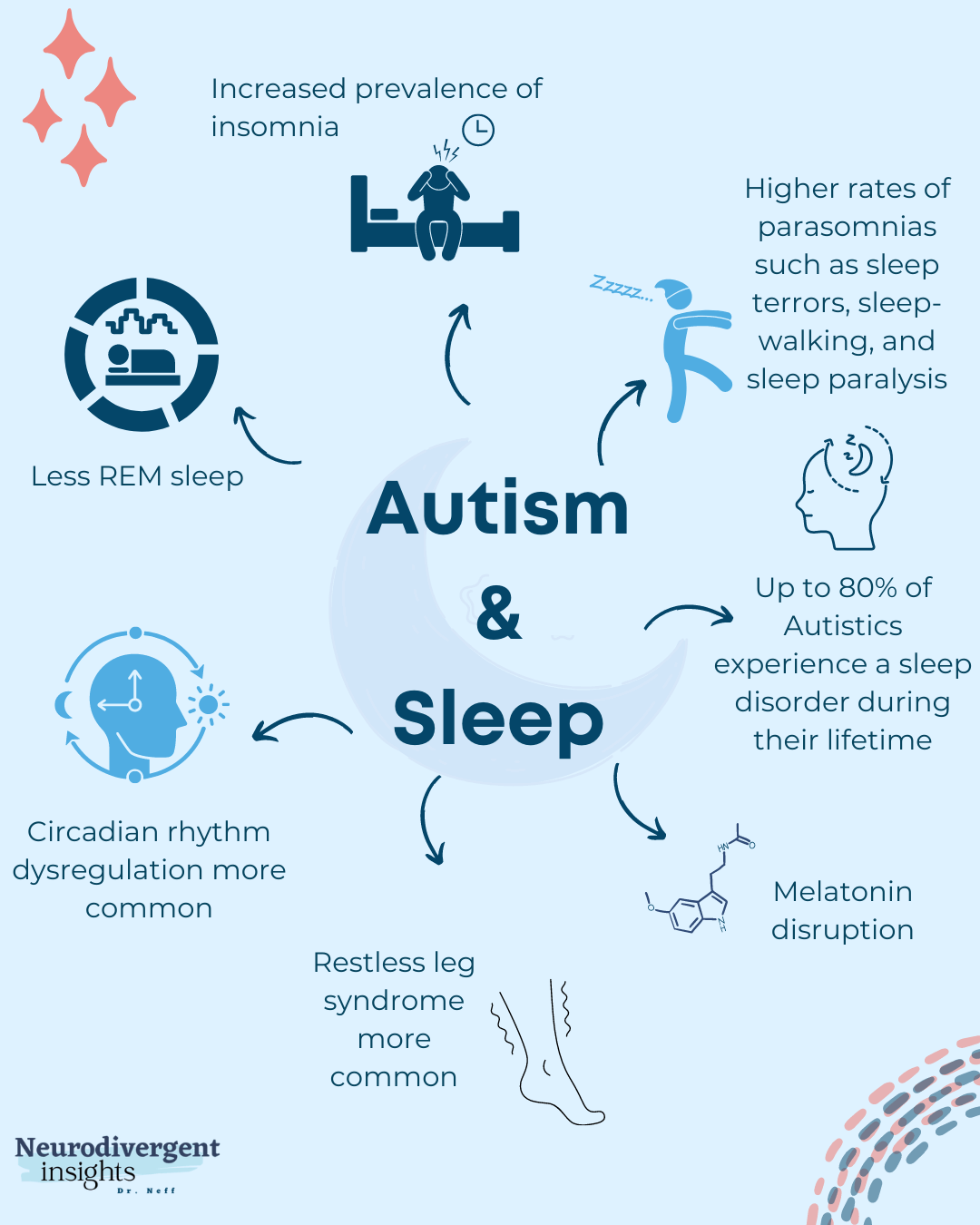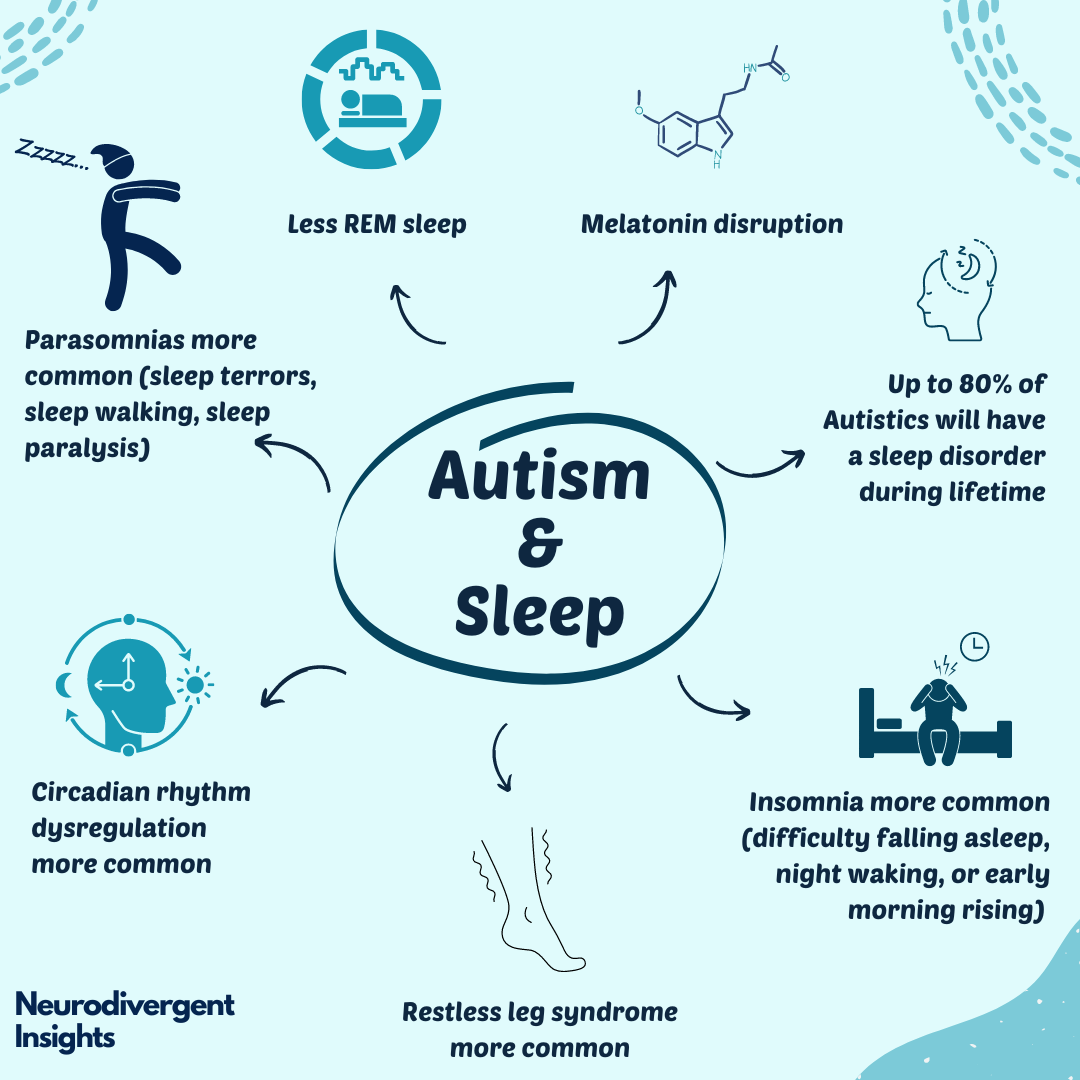Autism and Sleep
Sleep and Autistic Adults
If you google autism and sleep, most of the advice you get is on how to help your Autistic child get sleep. Don’t get me wrong, this is great, and my kids certainly have their fair share of sleep struggles! But what strikes me is the lack of resources for Autistic adults struggling with sleep! Autistic sleep problems don’t magically go away when we become adults. Many Autistic adults continue to experience insomnia, circadian rhythm disorders, sleep apnea, restless legs syndrome, and more!
So even though sleep issues and autism co-occur at high rates, it is often overlooked in adults. As an Autistic person myself, I understand—both personally and professionally—how difficult this can be for someone. Let’s look at the data:
If you want to do more of a deep dive into neurodivergence and sleep issues, you can see my deep dive article on it over here, including tips for improving sleep and working with sleep vulnerabilities.
Autism and Sleep Rundown
Sleep problems are one of the most common co-occurring conditions for Autistics. Here is a rundown of the infographic details:
50-80% of Autistic children experience sleep disorders (compared to 9-50% of neurotypical children) (Reynolds et al., 2019).
Autistics are more likely to have a circadian rhythm sleep-wake disorder (CRSWDs). Many Autistics have a mutation within the CLOCK gene, which impacts circadian rhythm. Despite this growing body of literature, Autism is rarely considered when a person is diagnosed with CRSWD.
Autistic people are more likely to have a mutation in genes regulating melatonin resulting in a “flat melatonin curve.” Thus our bodies often do not feel tired or send the same level of tired cues at night, and we may feel sleepier during portions of the day/upon waking (Furfaro, 2020).
On average, it takes autistics 11 minutes longer to fall asleep.
Autistic people are more likely to experience insomnia which includes everything from difficulty falling asleep to night waking and early morning rising (Furfaro, 2020).
Autistics are more likely to experience parasomnias, including sleep paralysis (waking but not being able to move), sleepwalking, and night terrors/sleep terrors.
On average, Autistic people spend roughly 15% of their time asleep in REM (while neurotypicals, on average, get 25%). REM sleep is where we consolidate learning and memory and is important for a host of physical and mental health things (Buckley et al., 2010; Neumeyer et al., 2019).
Repetitive behaviors & hyperactivity increase w/ poor sleep (which can make sleep more difficult).
Implications of Poor Sleep
Sleep is foundational for our physical and mental health. Our brains work hard when we sleep! They are storing our new learning and memories in long-term storage; they are detoxing our brains and releasing new neurotransmitters we need to feel refreshed.
Sleep and Neurotransmitters
During sleep, our brains release certain chemicals called neurotransmitters. These chemicals help regulate our mood, help us learn, grow and regulate our sleep-wake cycle. For example, when we're sleeping, our brains release
✦ Serotonin, which helps regulate our mood and makes us feel good.
✦ Acetylcholine, which is important for memory consolidation, learning, and attention
✦ Melatonin, which regulates the sleep-wake cycle and helps us feel sleepy
✦ Growth hormone, which helps the body grow and repair
When we don't get enough sleep, our brains don't get the chance to release these chemicals. And that can lead to a whole host of problems! When we're sleep-deprived, we're more likely to feel grumpy, anxious, and irritable. Plus, it's harder for us to focus and learn new things.
On the other hand, lack of sleep can lead to an increase in the levels of cortisol throughout the day, which is a stress hormone that can contribute to feelings of anxiety and difficulty relaxing. It also disrupts our circadian rhythm.
On the flip side, when we have enough good-quality sleep, it helps to maintain a balance in these hormones, which can improve our mood and overall mental well-being.
The Detoxing Benefits of Sleep
During sleep, the brain not only releases new chemicals, but it also cleans up from the day. It detoxifies certain chemicals, similar to how a cleaning cycle runs during the night while you sleep. If you ever wake up feeling refreshed and ready to start the day, it's likely because your brain was working to clear away certain chemicals and hormones while you slept. This process helps keep the brain and body functioning properly.
One of the main things it's cleaning up is a chemical called adenosine. Adenosine is like a sleepy chemical that builds up in your brain throughout the day. But while you sleep, your brain works to clear it out, so you wake up feeling more alert and less groggy.
Another thing your brain is cleaning up while you sleep is a chemical called glutamate. Glutamate helps with learning and remembering things. But when you're awake, your brain uses a lot of it. So, at night, your brain works to clear away any extra glutamate you don't need so that you're ready to learn and remember new things again in the morning.
Implications of Autism and Sleep
Beyond the typical health risks associated with sleep deprivation, sleep deprivation causes additional struggles for Autistic people, such as increased sensory sensitivities and executive functioning struggles.
Sensory Sensitivities
Sleep and sleep deprivation can have a significant impact on sensory sensitivities. When we are well-rested, our brains are better able to process and filter sensory input, allowing us to better tolerate and manage our sensitivities. Adequate sleep also helps to regulate our emotional responses to sensory stimuli, making us less likely to feel overwhelmed or reactive.
On the other hand, when we are sleep-deprived, our brains are less able to filter and process sensory input, making us more sensitive to stimuli. This can lead to increased feelings of overwhelm and irritability in response to sensory input. Additionally, sleep deprivation can also exacerbate symptoms of anxiety and depression, which can further worsen the experience of sensory sensitivities.
Many Autistic people have heightened sensory sensitivities, so the negative impact of sleep deprivation can be even more pronounced for us. Supporting our sleep can be an important part of managing our sensory sensitivities.
Executive Functioning
When Autism and sleep issues co-occur, this can amplify executive functioning difficulties. Executive functioning includes the ability to plan, organize, and break down complex tasks into smaller tasks. Executive function is controlled by the prefrontal cortex, an area of the brain that is particularly sensitive to lack of sleep.
When we don't get enough sleep, the prefrontal cortex doesn't function as well, leading to difficulties with planning, decision-making, impulse control, and more. This can make it even harder for Autistic people to manage our emotions and executive functioning challenges. This can make daily tasks such as work or school more challenging.
Conclusion
There is a significant overlap between Autism and sleep. Many Autistic people struggle with insomnia, REM sleep disruption, restless leg syndrome, and more. Because of this, sleep screening and treatment should be a part of holistic Autistic care.
If you’re Autistic and struggle with getting good sleep at night, I recommend checking out my article on ADHD, Autism, and Sleep. In this guide, not only will you get more information about sleep and neurodivergence, but you will also get loads of resources and strategies to help you get better sleep at night.
You can also download the Neurodivergent Sleep Guide, with several workbook pages to help you better understand your sleep.
Citations
Buckley, A. W., Rodriguez, A. J., Jennison, K., Buckley, J., Thurm, A., Sato, S., & Swedo, S. (2010). Rapid eye movement sleep percentage in children with autism compared with children with developmental delay and typical development. Archives of pediatrics & adolescent medicine, 164(11), 1032–1037. https://doi.org/10.1001/archpediatrics.2010.202
Furfaro, Hannah (2020). Sleep problems in autism, explained. Spectrum News. https://www.spectrumnews.org/news/sleep-problems-autism-explained/
Neumeyer, A. M., Anixt, J., Chan, J., Perrin, J. M., Murray, D., Coury, D. L., Bennett, A., Farmer, J., & Parker, R. A. (2019). Identifying Associations Among Co-Occurring Medical Conditions in Children With Autism Spectrum Disorders. Academic pediatrics, 19(3), 300–306. https://doi.org/10.1016/j.acap.2018.06.014
Reynolds, A. M., Soke, G. N., Sabourin, K. R., Hepburn, S., Katz, T., Wiggins, L. D., Schieve, L. A., & Levy, S. E. (2019). Sleep Problems in 2- to 5-Year-Olds With Autism Spectrum Disorder and Other Developmental Delays. Pediatrics, 143(3), e20180492. https://doi.org/10.1542/peds.2018-0492
This post was proofread by Grammarly, my go-to for proofreading and catching all the details I naturally miss! Grammarly is entirely free to use. Click here to give it a try.








